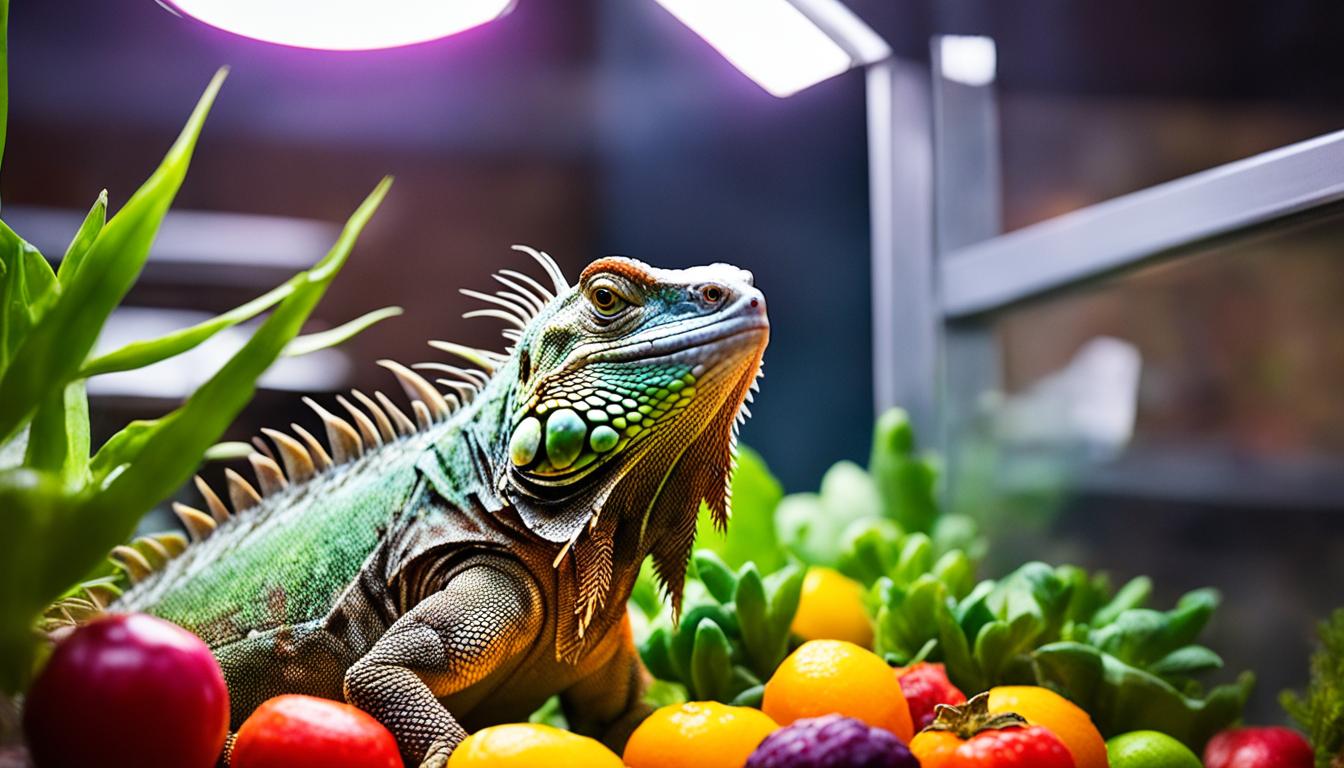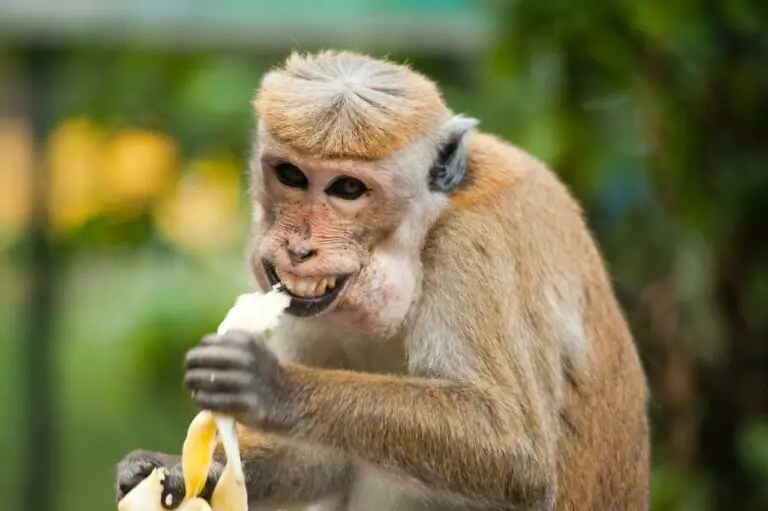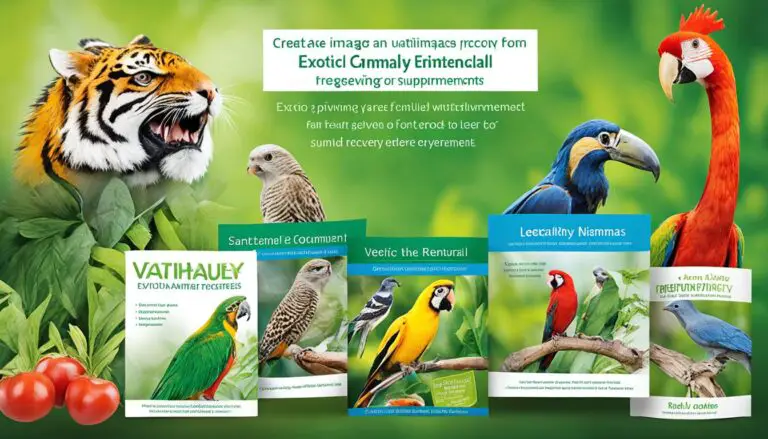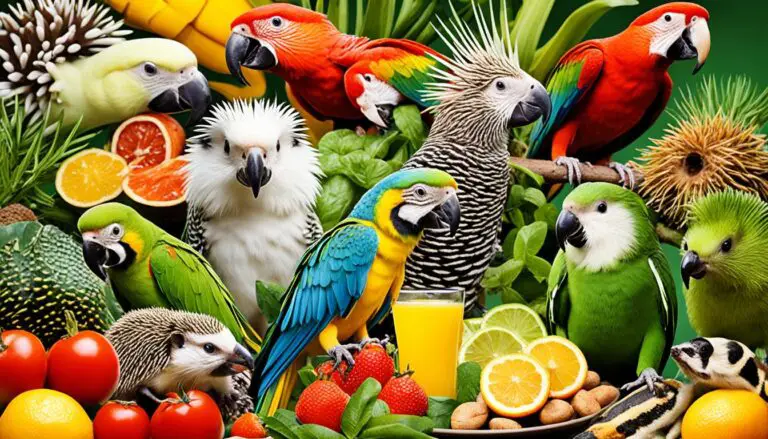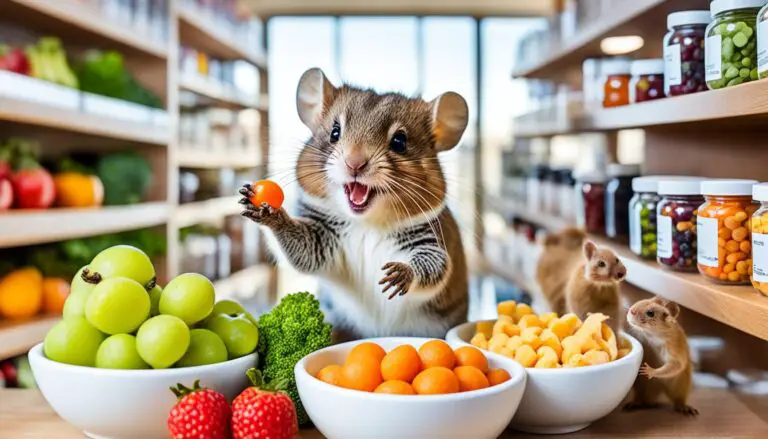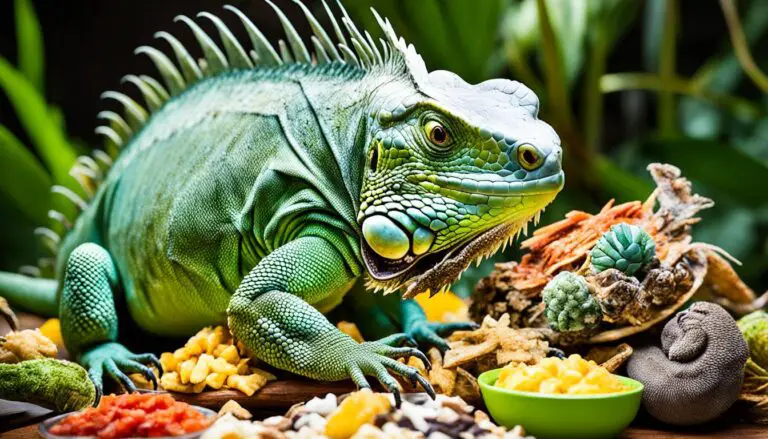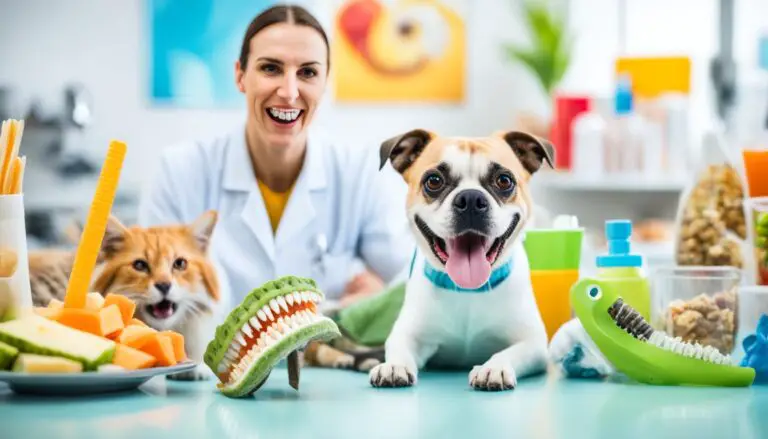Managing Aging Exotic Pets’ Nutrition Needs
Did you know that older exotic pets face more health issues? This is especially true for reptiles, birds, and small mammals. As these animals age, their dietary needs shift. A correct diet is key to keeping them healthy and happy. This guide dives into why nutrition is vital for older exotic pets and how to meet their specific needs.
Key Takeaways:
- Nutritional management is essential for geriatric exotic pets with age-related health concerns.
- Understanding the unique nutritional needs of exotic pets is crucial.
- Choose pet food specifically formulated for senior pets and avoid fillers and artificial additives.
- Consider any special dietary needs or restrictions your aging pet may have.
- Regular nutritional assessments and adjustments are necessary for senior exotic pets.
Understanding the Nutritional Needs of Exotic Pets
Exotic pets, like reptiles and birds, eat differently than dogs and cats. Each has its own special diet. As these pets grow older, they might need to eat different foods. It’s all about keeping them healthy and happy.

Just like people, exotic pets feel the effects of getting old. It can bring health problems. A special diet for older exotic animals helps them stay well and enjoy life. Knowing what to feed them is key for a long and healthy life.
Older exotic pets can face many health issues. Their diet helps, from keeping their joints healthy to supporting their organs. The right food can make a big difference. It helps them stay well for longer.
Special Considerations for Senior Pet Dietary Needs
As exotic pets get older, they need different foods. Changing their diet as they age is important. For senior exotic pets, their health conditions or species might mean special diet changes are needed.
Senior birds might need softer foods for their beaks. Rabbits and rodents might need more or less fiber for their stomachs. Reptiles could need help keeping their bones strong. A vet who knows about exotic pets can give great advice on what to feed them.
For older exotic pets, getting the right nutrition is very important. Their diet impacts their health a lot. A balanced diet with the right nutrients is crucial. This includes good protein, fats, vitamins, and minerals.
- Nutritional density to support their body cells and health.
- Protein for their muscles and to repair their bodies.
- Fats for a shiny coat, moving joints, and thinking well.
- Vitamins and minerals for a good immune system and health.
A good diet keeps our senior exotic pets strong and happy. Regular visits to the vet help. They can check the pets’ nutrition and health. Plus, they can help with any diet changes if needed.
| Senior Exotic Animal | Dietary Considerations |
|---|---|
| Reptiles | May need extras for their bones. Offer a mix of foods for all their needs. |
| Birds | Soft foods help their beak changes. Fresh fruits and veggies are a must. |
| Rabbits | More fiber is great for their stomachs. Watch the sweets to avoid extra weight. |
| Hamsters | Less food to fight obesity. Lots of safe veggies for their nutrients. |
Looking after the nutritional needs of our aging exotic pets is vital. A good diet helps them stay well and happy as they get older. Always talk to a vet who knows about exotic animals for the best food advice. They help us keep our pets healthy and enjoying life.
Choosing the Right Pet Food for Geriatric Exotic Pets
Choosing the correct pet food is vital for geriatric exotic pets. Their needs change with age. It’s essential to pick a diet that meets their unique requirements. Here’s what you need to know when choosing food for your aging exotic friend.
Age, Size, and Health Concerns
Think about your pet’s age, size, and any health issues. Each pet has different nutritional needs. Larger exotic pets might need extra nutrients. Those with health issues might benefit from special diets.
Pet Food Formulated for Senior Pets
Find food made for senior pets. These foods match the needs of aging exotic animals. They usually have the right mix of protein, vitamins, and minerals. Make sure the label says it’s for geriatric or senior pets.
Avoid Fillers, By-Products, and Artificial Additives
Choose pet food without fillers or by-products. Look for real, whole foods as main ingredients. This ensures your pet gets the necessary nutrients from their food.
Consult with a Veterinarian
Speaking with a vet is key to finding the best diet. A vet who knows about exotic pets can help. They can recommend pet food brands that meet your pet’s nutritional needs. They can also answer your diet questions.
| Benefits of Choosing the Right Pet Food |
|---|
| 1. Supports senior pet health and longevity |
| 2. Provides essential nutrients for aging pets |
| 3. Helps manage age-related health concerns |
| 4. Enhances overall well-being and vitality |

“Choosing the right pet food is an essential part of geriatric pet care. By selecting a diet that is specifically formulated for aging exotic pets and meets their nutritional needs, you can ensure their health and quality of life in their senior years.”
Picking the right food is crucial for your geriatric exotic pet. Consider their age, size, and any health problems. Choose pet food made for senior animals. Avoiding fillers and fake additives is important. And don’t forget to talk to a vet for advice. With the correct diet, your exotic pet can be healthy and happy in their older years.
Importance of Quality Ingredients in Pet Food
As pets get older, what they eat becomes crucial for their health. The ingredients in their food play a huge role. Choose pet food with top-grade, natural ingredients to meet your pet’s nutritional needs as they age.
For aging pets, pick meals with real meat, fruits, and veggies at the core. These foods offer a well-rounded, natural diet. They’re great for keeping your pet nourished over the years.
Steer clear of fillers and fake stuff. They lower the food’s value and don’t help aging pets much. Stick to meals made with care from quality components. This choice will boost your pet’s well-being in their later years.

Choosing Quality Ingredients
Always check the label when you pick out pet food. Opt for brands that feature real and familiar items like chicken, fish, and healthy grains. These choices pack the nutrients older pets need for a strong body and mind.
“Quality ingredients in pet food are the foundation of a nutritious diet for aging exotic pets.”
Going for quality ingredients isn’t just about nutrition. It’s also about keeping your pet lively as they get older. It helps with their immune system, their thinking skills, and even their joint health. Quality ingredients do a lot for your pet’s joy and wellness in their golden years.
Benefits of Quality Ingredients
Feeding your pet with high-quality food has many perks, especially for older animals:
- Improved digestion and nutrient absorption
- Enhanced immune system function
- Optimal weight management
- Healthy skin and coat
- Strong muscle development
Choosing food with premium ingredients is a smart move for your aging pet. It makes sure they get what they need to stay healthy and live well in their senior times.
Considering Special Dietary Needs and Restrictions
Geriatric exotic pets have special dietary needs and restrictions. Just like people, as pets age, they might have sensitivities, allergies, or health issues. This means they need a diet that’s made just for them to stay healthy and happy.
Many age-related pet health concerns can appear with exotic pets. For instance, some might have trouble with digestion. Others might start to react badly to certain foods. Knowing these factors is key for pet owners. It helps you provide the right nutrition for your pet.
Seeing a vet who knows about exotic pets is a smart move. They can look at your pet’s unique situation. Then, they’ll suggest the best pet food to keep your pet healthy. They might recommend a special diet like grain-free for allergies. Or a certain type of protein for sensitivities. Vets can really help you make the best choice for your pet.
“Choosing a pet food that caters to your geriatric exotic pet’s unique needs is crucial for their overall health and longevity.” – Dr. Sarah Johnson, DVM
When picking food for elderly exotic pets, focus on quality. Choose foods made from real, whole ingredients. Stay away from fillers, by-products, and fake stuff. A good diet helps your pet get the nutrients they need. It boosts their exotic pet aging support and keeps them healthy.

Tailoring Diet to Specific Health Needs
Older exotic pets need special diets just like humans. They may need a specific diet to stay healthy. Conditions like diabetes or kidney issues can change what they should eat. It’s key to partner with a vet who knows about exotic pets. They can help make a diet that fits your pet’s needs.
Pets with diabetes should have a diet that controls their blood sugar. This diet should include less carbs and more proteins. Healthy fats and fiber are also important. They can help keep blood sugar stable and the pet healthy.
Exotic pets with kidney disease need a different diet. This diet reduces stress on their kidneys. It should have low phosphorus and keep them well hydrated. Adding in the right amount of protein is also important.
To keep older exotic pets healthy, the right diet is vital. With a vet’s help, you can make sure your pet gets the right nutrition. This way, their health needs are met, and they can feel good.
The Role of Veterinary Nutrition for Older Pets
Veterinary nutrition is important for keeping older pets, even exotic ones, healthy longer. A special diet can help with their specific health problems. This can make their life better. Nutritionists know what older pets need. They can help make a diet plan just for your exotic pet.
Regular Nutritional Assessments and Adjustments
It’s important to assess the nutritional needs of exotic pets as they get older. Just like with humans, their diets may need to change with age. Working with a vet is crucial for monitoring and updating your pet’s nutrition.
Vets look at your pet’s health, shape, and what they eat during an assessment. They consider your pet’s weight, how active they are, and any health issues they might face. From this info, vets can offer a diet that is just right for your pet, improving their health.
Checking your pet’s weight regularly is vital. Obesity can harm pets, especially as they grow older. Your vet will help you keep your pet at a healthy weight, including how much food they should eat.
Vets might also suggest tests to check your pet’s organs and make sure they are healthy. They could do blood tests or check your pet’s urine. These tests provide detailed info about your pet’s health and help ensure they’re getting the right nutrition.
Staying in touch with your vet is key to your pet’s health. Let them know about any changes you see in your pet’s actions, how much they eat, or how they look. This way, your vet can give advice that fits your pet’s exact needs.
Making Adjustments to Your Pet’s Diet
After a nutritional review, your vet might suggest changes in your pet’s diet. These changes can fix any diet problems and make sure your pet gets everything they need as they age.
Adjustments could involve:
- Changing how much your pet eats
- Switching them to a diet made for older pets
- Altering how much protein, fats, and carbs are in their food
- Adding supplements for extra health support
It’s crucial to do what your vet says and keep an eye on your pet’s reaction to diet changes. Follow-up visits will help see if the adjustments are working or if more changes are needed.
Example Table: Nutritional Assessment and Adjustment Guidelines
| Assessment Area | Recommended Guidelines |
|---|---|
| Body Weight | Regularly monitor weight and adjust portion sizes as needed to maintain a healthy weight. |
| Overall Health | Regular check-ups and blood tests to assess organ function and overall health status. |
| Nutrient Requirements | Adjust diet to meet specific nutrient requirements based on age and health concerns. |
| Specialized Diets | Consider switching to a specialized diet formulated for aging exotic pets. |
| Additive Supplements | Include supplements to support specific health concerns, such as joint health or digestive health. |
“Regular nutritional assessments help ensure that aging exotic pets receive the specialized diet they need to maintain optimal health as they age.”
Weight Management for Aging Exotic Pets
Keeping your aging exotic pet at a healthy weight is crucial. Too much weight can hurt their joints and organs. By managing their food and exercise, they stay in good shape.
A proper weight helps avoid obesity and the troubles aging can bring. Your pets will move better, feel less pain, and enjoy life more.
Controlling Calorie Intake
Watch how many calories your pet eats to keep their weight in check. A balanced diet is important. Talk to a vet to figure out how many calories your pet needs each day based on their age, size, and health.
Vets can give you diet tips or recommend special foods for older pets.
Regular Exercise for Aging Exotic Pets
Exercise is a must for aging pets to stay fit. Pick activities that are easy on their bodies. This could be gentle walks or fun, easy games.
Don’t forget about mental exercise. Toys and puzzles keep their brains sharp and bodies active.
| Benefits of Weight Management for Aging Exotic Pets |
|---|
| Reduces the risk of obesity |
| Minimizes strain on joints and organs |
| Improves mobility and reduces pain |
| Enhances overall quality of life |
Consulting with a Veterinarian
A vet that knows about exotic pets is your best guide. They will check your pet’s weight and health. They will also give advice on food and design an exercise plan for them.
Keeping up with vet visits is important. This lets them track your pet’s progress and make changes as needed.
Importance of Nutritional Counseling for Geriatric Exotic Pets
Proper nutrition is key for older exotic pets. Their needs change and require special care. Nutritional counseling helps meet their specific health needs, improving their care.
It’s vital to talk to a vet who knows about caring for older exotic pets. They can create a diet plan that fits your pet’s unique needs. With their help, your pet will get the right nutrients for its age, staying healthy.
Professional Guidance to Address Age-Related Health Issues
Older pets, including exotic ones, face common health issues. Nutritional counseling helps prevent and manage these, improving their quality of life. Working with a vet, you can tailor a diet that suits your pet’s health needs perfectly.
“Nutritional counseling aims to optimize the well-being of geriatric exotic pets by tailoring their diet to their individual health requirements.”
Regular meets and counseling adjust the diet as needed, keeping your pet in good health. This proactive care can add years to your pet’s life and keep them happy. Addressing health issues with care early on is key for their well-being.
Considerations for Geriatric Exotic Pet Nutrition
Older exotic pets have nutrition needs that vary by species. These include allergies and specific diets. Nutritional guidance ensures your pet gets food that’s just right for them.
For pets with health conditions like arthritis or diabetes, special diets may be necessary. A vet can recommend foods that help manage these conditions. Nutritional advice is crucial in keeping your pet healthy as they age.
Supporting the Overall Health and Well-Being of Aging Exotic Pets
Nutrition is a big part of caring for older exotic pets. Proper advice and diet plans from a vet specialized in their care are crucial. This ensures they live a long and healthy life in their senior years.
With ongoing vet visits and counseling, you can give your pet a great life in their old age. Good nutrition and care make a big difference in an exotic pet’s happiness and health.
Conclusion
It’s vital to meet the nutritional needs of geriatric exotic pets. They have specific dietary needs due to age-related health issues. Choosing the right pet food is key for their well-being.
As exotic pets grow older, their diets may need adjusting. It’s important to talk to your vet regularly about this. This helps them stay healthy and happy in their later years.
Regular check-ups and advice from the vet are crucial for elder pet health. These allow for necessary diet changes and spot health issues early. This focus on nutrition makes a big difference in their well-being and life quality.
For your aging exotic friend, nutrition is very important. The right diet ensures they not only survive but thrive in their old age. With good care and a proper diet, you can help your geriatric pet live a joyful and satisfying life.
FAQ
What are the specific nutritional needs of geriatric exotic pets?
How do I choose the right pet food for my aging exotic pet?
Why are quality ingredients important in pet food for aging exotic pets?
What should I consider for geriatric exotic pets with special dietary needs or restrictions?
How can I tailor my aging exotic pet’s diet to address specific health needs?
How often should I assess and adjust my aging exotic pet’s diet?
How can I manage the weight of my aging exotic pet?
How can nutritional counseling benefit my aging exotic pet?
Source Links
- https://braescroftanimalclinic.com/how-to-select-the-right-pet-food-for-dogs-cats-and-exotic-pets/
- https://pawsoflife-org.k9handleracademy.com/Library/Health/Laflamme_2005.pdf
- https://allpetsvetcenter.com/nutrition-weight-management/
Peter Stones is the founder of Exotic Pets Place, the leading online resource for exotic pet care information.
With over 10 years of hands-on exotic pet ownership experience, he is deeply passionate about sharing his expertise to help others properly care for their unusual pets.
When he's not writing extensively researched articles or connecting with fellow exotic pet enthusiasts worldwide, you can find Peter at home tending to his own beloved menagerie of exotic animals.

